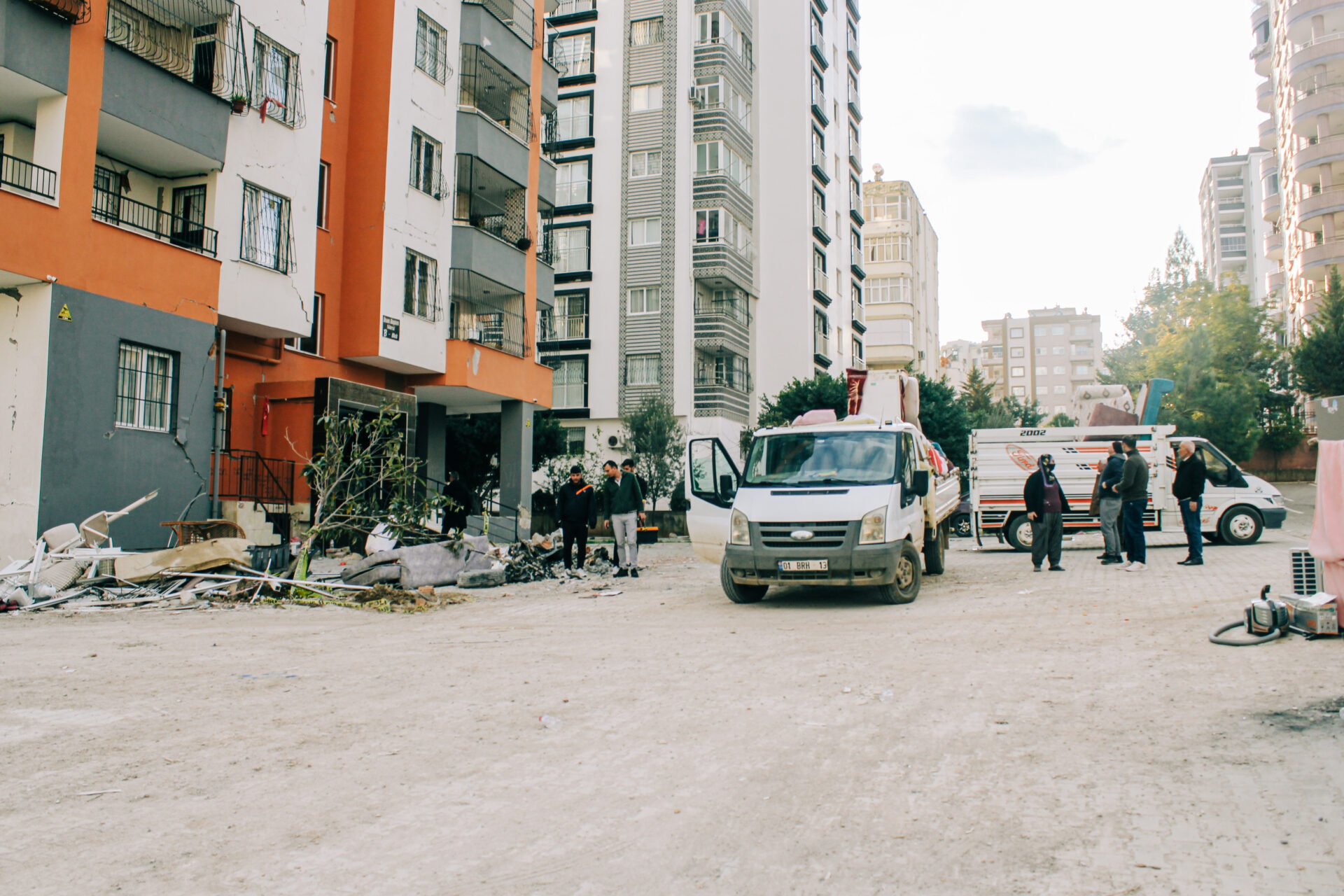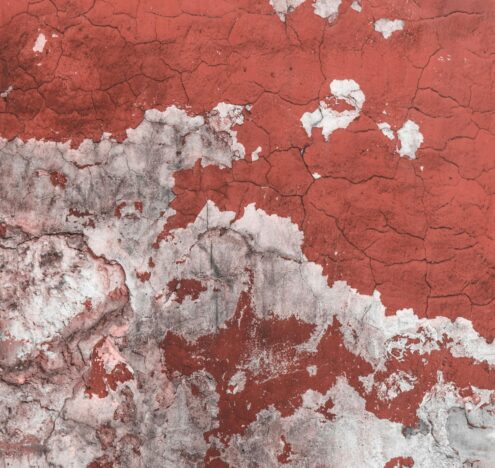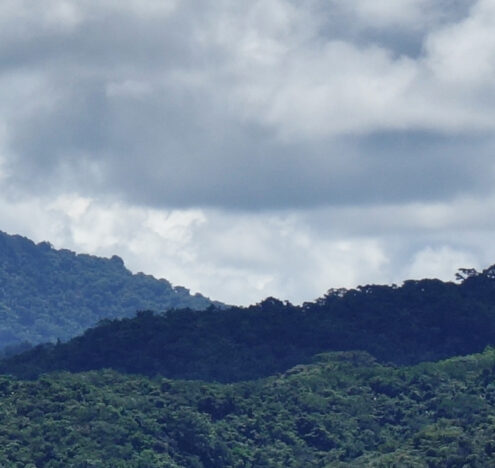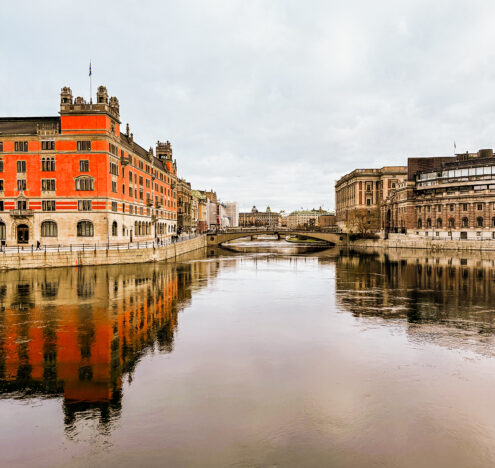Zeynep Koca, 49, sits in front of her tent alongside her two children near one of the sites of a collapsed building in Adana in southeastern Turkey, which experienced a 7.8 earthquake on Feb. 6, 2023.
Dozens of tents are here, representing a small fraction of some of the more than 2 million people that were made homeless by the earthquake, with a death toll of more than 46,000 people in Turkey and Syria.
“We need everything in order to build a new life. I don’t have anything left. I don’t even have salt,” Koca said.
She said her home was severely damaged, and she was expecting to be resettled at a dormitory. Koca said others whose homes were damaged or only slightly will likely be told to return home by the government.
“We are waiting for our state to provide housing to all of us,” she said. “We are cold.”
TOP PRIORITIES FROM THE GROUND
Shelter is one of the top needs for earthquake victims, said Ana Mora, an international communications specialist for Action Against Hunger, which has been providing food baskets and hygiene kits, among other support.
Her team has been traveling the region, working alongside its Turkish partner Hayata Destek or Support for Life.
“We need to rebuild not only the cities but also the people’s psychological well-being,” she stated.
Many of the people staying in the tents expect to be there for one or two months. Gonca Akpinar, a coordinator with the Turkish nongovernmental organization Anadolu Halk ve Barış Platformu (AHBAP) or People and Peace Platform of Anatolia, stated that improving those conditions is the top priority.
“The primary need for people will be secure, heated houses [and] being able to get personal hygiene,” she wrote in a message in Inkstick.
Not having a home leads to other problems, such as a lack of access to sanitation and water for people to wash themselves.
“A lot of people haven’t been able to shower,” said Mora. “There’s so many people that have lost everything.”
Hygiene and sanitation issues can increase the risk of waterborne diseases, Mora added.
Natural disasters can lead to the spread of infectious diseases by displacing people and putting them into overcrowded conditions, as well as limiting access to safe water and sanitation systems. The World Health Organization has warned of a “secondary disaster” for survivors lacking necessities that could be worse than the initial harm of the earthquake.
In Turkey, people have been suffering from respiratory illnesses and diarrhea due to the lack of clean water, while in Syria, cholera and secondary wound infections are top concerns.
Turkish President Recep Tayyip Erdoǧan announced on Feb. 11, 2023, that they would be allowed to move into university dorms, and students would shift to online education. However, that has not come without controversy, with university students in the southwestern city of Izmir protesting the move.
Staying out in the cold can also exasperate health problems, said Daniel Clancy, director of international operations and crisis innovation at Team Rubicon, a US veteran-led disaster relief organization.
Clancy said his team in Adana is currently assessing the needs of the local population in the southeast and surveying pharmacies, and looking at drug supplies to see what medicine is available. He said the organization is currently waiting to hear if the government will request them to go into an area to provide healthcare.
Team Rubicon was started during the 2010 Haiti earthquake, which Clancy said showed the need to establish minimum standards for groups that operate during disasters to avoid chaos.
“The effort now is to make sure that teams have a standard understanding across the provision of care,” Clancy said.
However, providing that care and support to residents in need has come with many challenges in Turkey’s earthquake region.
HOW AID WORKERS ARE GETTING IT DONE
The vast area that was impacted meant aid workers would have to travel across hundreds of miles. Some of the roads were damaged, and the ones that were usable were jammed with traffic: people trying to leave, people trying to get to their relatives that they feared had been hurt, and all the others on their way to rescue and provide support.
Mora said a drive that normally would take six hours turned into 16 hours on the road in the first week of the quake.
“Traffic has been insane,” she said. “There’s been a lot of movement at the same time.”
ABHAP has been using smaller vehicles to get to hard-to-reach areas instead of larger trucks that might not find space to go. “Everyone in their own cities hurried to send aid on their own, independently, which worsened the traffic and storage problems,” Akpinar stated.
For Action Against Hunger, one element that made its operations smoother was partnering with a local organization, which provided local knowledge and pre-existing relationships with authorities.
“You get aid that is more holistic because you get expertise and technical knowledge from an organization like ours,” she said.
“[Plus] you start working with someone that’s already in the context, that knows how things are done,” she said.
The city of Adana is the most western part of the region impacted by the earthquake.
In a site next to a collapsed building, people come out of another damaged building carrying their belongings and placing them in the back of a truck. A line forms for hot meals, and across the street, there are more groups of tents. People huddle around bonfires to keep warm, and boxes of donated clothes lay nearby. There is a charging station for phones; many say they still cannot reach some relatives whose homes were in badly affected areas.
At the airport, armed soldiers with rifles stand near the entrance. Some of those in need have already left the region on free flights from Turkish Airlines. The departures area is busy with residents who are leaving on free flights to other parts of the country and rescue teams who have given up their efforts of finding more survivors.
The arrivals section one afternoon was near empty aside from some workers, including with Turkey’s Disaster Management Authority (AFAD).
Several questions and criticisms have been raised over the authorities and the government’s handling of the crisis. One of them is what has happened to money from a tax that was meant to be used to prepare for a major earthquake. It was established after the 1999 earthquake, which killed more than 17,000 people, to help strengthen buildings, but it is unknown how the money has been used.
Turkey’s presidential communications office told Inkstick that questions should be directed to AFAD.
AFAD did not respond to Inkstick’s requests for comment.
NEXT STEPS
Both Action for Hunger’s Mora and ABHAP’s Akpinar pointed to the need for jobs as many people will have lost their livelihoods.
“People will also require economic security and a labor force in order to rebuild the social economic life that they lost,” stated Akpinar.
Mora said eventually, their organization will move to give people cash instead of products so that they can decide for themselves what they need and to give them agency.
One of the obstacles to employment may be racist attitudes toward the local population, many of whom are Kurdish or Arabic, given the proximity to the Syrian border and the influx of refugees into Turkey. The head of a local chamber of commerce in the northwestern province of Kocaeli said people should not employ those who have come from the earthquake region, citing concerns over “demographics,” Turkish news outlet Duvar English reported.
There is also a need that goes beyond finances and goods.
Akpinar stated that her organization is establishing mental health centers to assist locals, especially children.
“We need to rebuild not only the cities but also the people’s psychological well-being,” she stated.
Back at the tents, Koca said her and her husband’s livelihoods are in question because she does not know whether their store selling accessories will be viable anymore.
However, her top concern is where she and her children will be living next.
“They were psychologically affected because they lost their home. They don’t want to stay here, they want to go home. But the earthquake is terrible, it’s so terrible,” she said.





















